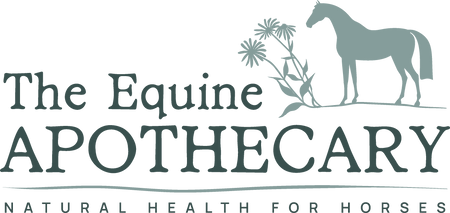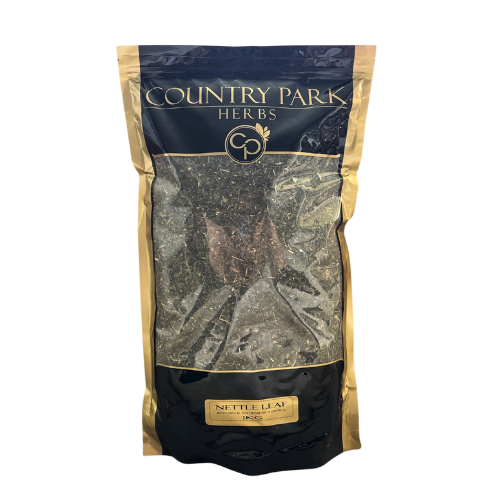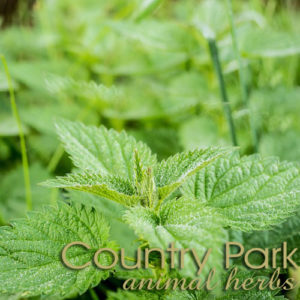Nettle Leaf
Couldn't load pickup availability
Urtica dioica
**NOTE - this product is discounted as it is past its "Best Before" date**
Nettle, so often snubbed as merely a weed, has an amazing array of talents. It can clothe you, feed you, light your lamps, and be medicinal!
It is considered a spring tonic and detoxifier for human and animal alike. It is rich in chlorophyll, and is an excellent source of calcium, chromium, magnesium, zinc, cobalt, manganese, phosphorous, potassium, protein, riboflavin, selenium, silicon, thiamine, vitamin A, vitamin C and vitamin K. No wonder then that nettle is such an appetiser, and conditioning, restorative tonic for horses. It is reputed to enhance coat shine and dappling, and, interestingly, is a folk remedy for hair loss (perhaps based on its reputation for enhancing circulation).
Nettle is diuretic (increases urine production) and has been helpful in eliminating uric acid from the body and thereby relieving the symptoms of gout. It is also approved for treating and preventing kidney stones.
Nettle has been shown to have a number of anti-inflammatory constituents which act via more than one pathway in the body. This anti-inflammatory activity, hand-in-hand with nettle’s ability to reduce bleeding, has been applied to easing gastro-intestinal troubles, including inflammatory bowel disease.
Sufferers of arthritis (both osteo- and rheumatoid) have received significant benefit from using nettle. It can be taken internally or applied externally – studies of both methods have shown relief of symptoms. Amazing results have also been seen when nettle is used as an adjunct to standard drug anti-inflammatory treatment. In one study, patients who took a combination of nettle and an anti-inflammatory drug substantially reduced the dose of the drug needed for pain relief. Only one quarter of the standard dose required to provide pain relief was needed when drug treatment was combined with nettle intake.
Nettle has a centuries old reputation for relieving the symptoms of nasal and respiratory ailments such as bronchitis, asthma and allergic rhinitis, as well as skin conditions such as eczema.
Research across the world has vouched for nettle root’s contribution to treating the discomforting symptoms of benign prostate hypertrophy (prostate enlargement). On its own, or in combination with other herbs, nettle root improves Prostate Symptom Scores, and in one study nettle root combined with the herb saw palmetto was equally as effective as drug treatment, with the herb extract treatment tolerated much better by patients due to less side effects.
Nettle is sometimes used (with other herbs) in the treatment of laminitic horses, usually on the basis of its stimulation of circulation and promotion of toxin elimination. Extra support for its use in treating/preventing this ailment may also come from animal studies that have indicated a hypoglycaemic effect of nettle – animals treated with a nettle leaf extract had decreased blood sugar levels due to an increased production of insulin.
If you want to harvest your own nettles for you or your animals, be sure to arm yourself with sturdy gloves and secateurs, and ensure you are selecting the correct nettle species. To prevent the nettles stinging when they’re eaten the leaves must be allowed to wilt before being fed. Additional caution can be taken by allowing them to dry and then cutting them before feeding them. For humans they can be cooked as spinach would; and while a cup of nettle tea may do your body a world of good, your tongue will almost certainly prefer a softening of the “mown grass” taste of nettle tea by the addition of a little honey. Your horse will likely relish the grassy taste!
An interesting note: It may seem counter-intuitive, but if you are stung by nettles it is the plant itself that supplies the remedy… the juice from the plant, when applied to the sting, will relieve it.
ACTIONS include: Leaf – diuretic (increasing the flow of urine), nutritive, anti-allergic, astringent (constricts and firms membranes), styptic (stops blood flow when applied externally), galactogogue (promoting the production and flow of breast milk), hypoglycaemic, anti-diarrhoeal, anti-inflammatory, alterative (“blood cleansing”), stimulating to circulation, tonic.
Root – inhibits/reduces the symptoms associated with benign prostate enlargement.
CAUTION: Very occasionally a person or animal may develop a rash in response to ingesting nettle. If so, discontinue feeding it and seek the advice of a herbalist. A lower dose may be required for that individual, or possibly a complete elimination of nettle. Very occasionally gastro-intestinal symptoms may result from ingesting nettle root. It is generally considered a very safe herb.
While some authors advise caution on the use of nettle during pregnancy, others disagree and do not expect adverse effects.
DOSAGE: Recommendations for an average sized (450kg) horse range from 15g (approx 1/3 cup) per day to one cup three times a day. “The European Medicines Agency saw fit to establish no maximum intake on nettle herb for animals”1 and there is no restriction on long term use.
DRUG INTERACTIONS: Due to a lack of hard evidence, the potential for nettle to interact with drugs is largely speculative, based on the known actions of nettle. Some caution may be required if combining nettle with anti-hypertensives, anticoagulants, Central Nervous System depressants, diuretics, insulin, and oral hypoglycaemic agents. Nettle root may have additive effects on prescribed medication for BPH, but this may be beneficial. As mentioned previously, arthritis sufferers were able to reduce drug dose whilst taking nettle. 1Wynn and Fougere, 2007.
Available in 1kg.




